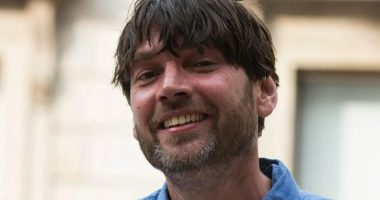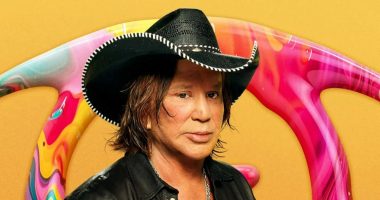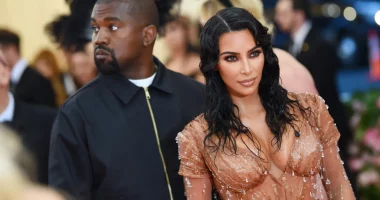“I WAS terrible at maths,” admits Ray Davies.
The Kinks frontman, chief songwriter and master storyteller is sifting through the mists of time to his troubled schooldays.

9

9

9
“I was so awful at it that my teacher would pull my hair or make me stand on my toes . . . the usual torment,” he continues.
“Nowadays, he’d be taken to court.”
Ray remembers that he and his fellow pupils, including younger brother and bandmate Dave, fitted into one of two categories.
“You were either good or bad.


“I was in the bad sector and justice was swift!”
But the teenage Ray DID show promise in creative writing.
“I was in my own little world,” he adds. “And I still am.”
So those dark days at William Grimshaw Secondary Modern School in Muswell Hill, North London, did at least inspire a song or two.
The Hard Way and I’m In Disgrace first appeared on a 1975 concept album and now they’re included on a new Kinks compilation, The Journey Part 1.
The themed 36-track set celebrates the 60th anniversary of the chart sensations who gave The Beatles and the Rolling Stones a run for their money in the Sixties.
This is the first “best of” to be curated by band members themselves, namely Ray, Dave and Mick Avory, drummer from 1964 to 1984.
While including major hits such as You Really Got Me and Waterloo Sunset, the album also finds room for intriguing deeper dives into The Kinks’ back catalogue.
Its release has given me another chance to talk to Sir Raymond Douglas Davies, 78, arguably the only British songwriter worthy of mention in the same breath as Lennon and McCartney.
He recalls his precociously talented teenage self who formed The Kinks with Dave, Mick and his dear friend, the late bassist Pete Quaife.
“I was a pain in the arse,” he confesses.
“I thought I knew how to do it all.
“When you’re 17 or 18, you think you have the only viewpoint available.
“To be fair, I did listen to people but I was very selective about who I listened to.”
As for the band, he adds: “We were mates.
“My brother was on guitar, my best friend was on bass.
“Mick came along from South London and, er, we couldn’t hold that against him.
“If we hadn’t been friends, we wouldn’t have survived.”
Ray tells me why he didn’t really want to be the centre of attention in The Kinks.
“As kids growing up after the Second World War, music was more of a social thing, before headphones became popular.
“I had three musical heroes, Chet Atkins, who was a great country player, Big Bill Broonzy, seminal blues artist, and a guy called Tal Farlow, from Indiana.
“So I wanted to be like Farlow and just sit at the side, play guitar and let other people do the hard work.”
Despite his reluctance, we all know that Ray quickly became The Kinks’ principal singer with Dave occasionally stepping up.
‘Too aggressive’
“I thought there was too much responsibility in being a frontman so I tried to give the job to Dave but he didn’t accept it,” he says.
“Also, they [Pye record label] thought I had good diction in the days when manners prevailed. ‘My dear boy, you should be the singer,’ they told me.”
Another huge factor for Ray was the emergence of the game-changing Fab Four, whose string of thrilling hits put them at the front of the “British Invasion” of the States.
“I was at art school when The Beatles came out and I was amazed by them,” he affirms.
“When I listened to their first and second albums [Please Please Me and With The Beatles], I said, ‘This is a great vocal sound’. John Lennon singing Money (That’s What I Want) was outstanding.”
But, even at the start, The Kinks offered something different, from the powerchords of their early triumphs to the swift development of Ray’s lyricism, which left the simple girl-meets-boy love song trailing in its wake.
This explains why he is so revered today for compositions that not only addressed the vagaries of love but also culture, fashion, the class divide and so much more.
Who can forget his portrayal of lovers Terry and Julie gazing on Waterloo Sunset or his window into a couple’s struggle to make ends meet on Dead End Street?
And what about his nostalgic reveries evoking the atmosphere of an England that once was?
During our chat, Ray comes up with a fascinating anecdote to go with every song we dwell upon.
So let’s start with his first big success as leader of The Kinks — the powerhouse, riff-driven hit he wrote before he reached 20, You Really Got Me.
“As a teenager, I was just a guitar player but I wanted to form an orchestra of guitars,” he says.
“The You Really Got Me riff just came to me and Dave brought the sound with his electric guitar.
“The record company didn’t want us to put it out because they thought it was too aggressive.
“I don’t know what they’d do with it in today’s world.”
You Really Got Me has been described as a pivotal influence on hard rock.
But Ray says: “I came from a more R&B background and though the song might seem as two-dimensional as heavy metal, people overlook the subtle rhythm underneath.”
He recollects the first time The Kinks played it on television.
“It was Jukebox Jury and this ordinary girl says, ‘I’ll give it five out of five’.”
Like so many acts of the day, the bandmates were determined to be sharp dressers.
Read Related Also: ‘The Challenge’ Champ CT Tamburello Credits His Recent Winning Streak to His Son

9

9

9
“Yeah, the hunting jackets,” muses Ray.
“After You Really Got Me was a hit, we went to Australia where it was a hundred degrees and had to do a concert wearing those heavy jackets.”
When what was only their third single hit No 1 in the UK, the record company was determined to capitalise with a quick-fire follow-up.
Ray says: “You Really Got Me was slipping down the charts and they wanted another song.
“We were going to a gig in Birmingham and before I left, I tinkered around on the piano and came up with a riff.”
By the time they got there, Ray had cracked All Day And All Of The Night.
“We played it at soundcheck, did the show, went back to London and recorded it the next morning.
“If we’d thought about it too much, it wouldn’t have been as good.”
Explaining this rapid burst of creativity, Ray gives a telling insight: “With songs that I wrote straight away, I’d already planted ideas and thoughts in my head.
“When I needed them to come out, I selected them like a travelling salesman.”
Next we discuss Tired Of Waiting For You, which Ray says is just as much about waiting for the 102 bus as for a girl.
“We did the backing track to that and then I wrote the words on the Tube on my way to Oxford Street for a date.”
Ray casts his mind back to the moment he played Wait Till The Summer Comes Along to older sister Rosie, who “was like a parent to me” but soon emigrated to Australia.
“She didn’t make a comment about the record — she probably liked it — but she said, ‘Raymond, you’ve got to look after David when you’re on tour because he gets into all sorts of trouble’.
“I said, ‘I’ll try my best’. So, I looked after him and then I got in trouble.”
‘Broken jaw and nose’
It’s great that Ray and Dave have worked on the new Kinks compilation despite a fair amount of sibling turbulence across the 60 years.
“Thanks to email, we have a good but distant relationship now,” says the older brother.
Growing up in North London as the second youngest of eight children (Dave being the baby of the family), Ray has never forgotten his working-class roots.
One the first realisations of this in song was Dead End Street, showing his awareness of hardship in post-war Britain.
“I listened to adults a lot as a kid,” he says.
“When I was 19, I had a mental age of 50!
“Hearing older people reminiscing about the Second World War and The Depression, I took what they said on board.
“The Sixties were great but it was a time when people covered up the dirty side of life, the cruel side of life, because it was all about happiness then.
“I respected my elders and I wanted to make a record that reflected their generation.”
This brings us to Ray’s most iconic song, Waterloo Sunset.
“It comes from two experiences,” he says.
“When I was about 14, I was in hospital with a broken jaw and nose.
“They had to give me a tracheotomy but the balloon burst in the night and I felt myself suffocating.
“Somehow I recovered and, the next morning, they took me out and stood me on a balcony overlooking the Thames and the Houses of Parliament.
“That view stayed with me and, years later, I walked over the river with my first wife towards Waterloo.”
The resulting Waterloo Sunset appeared as a single in 1967 and was also the final track on the album Something Else By The Kinks.
Ray says: “To me, it’s a very simple song, I woke up one morning singing it and jotted it down in the notebook I used to keep beside my bed.
“It’s a bit ambiguous but it’s the 14-year-old me standing on that balcony, looking at my future.”
We turn our attention to one of Ray’s most enigmatic compositions, Days, beautiful but hard to pin down.

9

9
Rays pauses to think for a while and says: “It falls into the realm of break-up songs.
“But it’s more than that. It could be about losing anything cherished and dealing with the loss.
“I was very moved the other week.
“I was watching Match Of The Day and they played Days behind a brief piece about John Motson.”
Finally, Ray talks about The Kinks’ 1972 hit Supersonic Rocket Ship, his typically evocative description of a trip on Concorde, organised to help him meet a deadline.
“I’d been in the studio for three days solid finishing an album [Everybody’s In Show-Biz] and I had to take it to New York to be mastered,” he says.
“I went straight from the studio and jumped into a cab before getting on the plane.
“It was another world. They brought champagne round and I said, ‘Can I not have that, can I have two aspirin?’.
“Then I fell asleep all the way.
“When I woke up, I realised I’d been sitting next to Warren Beatty!”
As you may have gathered.
Where there’s Ray Davies, a story and a song is never far away.

9
THE KINKS
The Journey Part 1
★★★★☆
!function(f,b,e,v,n,t,s){if(f.fbq)return;n=f.fbq=function(){n.callMethod?
n.callMethod.apply(n,arguments):n.queue.push(arguments)};if(!f._fbq)f._fbq=n;
n.push=n;n.loaded=!0;n.version=’2.0′;n.queue=[];t=b.createElement(e);t.async=!0;
t.src=v;s=b.getElementsByTagName(e)[0];s.parentNode.insertBefore(t,s)}(window,
document,’script’,’
fbq(‘init’, ‘752905198150451’);
fbq(‘track’, “PageView”);









